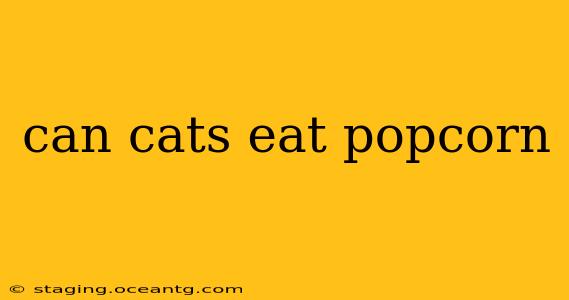Popcorn, a beloved movie snack, often finds its way onto the floor, tempting our feline friends. But is this crunchy treat safe for our furry companions? The short answer is: it's complicated. While a tiny nibble of plain, air-popped popcorn might not cause immediate harm, it's generally best to avoid feeding your cat popcorn altogether. This comprehensive guide will explore the reasons why, addressing common concerns and misconceptions.
Is Popcorn Toxic to Cats?
No, popcorn itself isn't inherently toxic to cats. However, several factors make it an unsuitable treat:
-
Choking Hazard: Popcorn kernels, especially unpopped ones, pose a significant choking risk. Their small size and irregular shape can easily become lodged in a cat's throat.
-
Digestive Issues: Even popped kernels can be difficult for cats to digest. They lack the enzymes to break down the complex carbohydrates found in corn, leading to potential gastrointestinal upset such as vomiting or diarrhea.
-
Seasoning: The real danger lies in the seasonings added to popcorn. Butter, salt, sugar, and various flavorings are highly detrimental to a cat's health. Salt can lead to sodium ion poisoning, causing vomiting, diarrhea, tremors, and even seizures. Butter and excessive fats can contribute to pancreatitis, a severe and potentially fatal inflammation of the pancreas. Artificial flavorings and preservatives can also contain harmful chemicals.
What Happens if My Cat Eats Popcorn?
If your cat has ingested a small amount of plain, air-popped popcorn, they may show no adverse effects. However, monitor them closely for any signs of digestive upset, such as vomiting, diarrhea, or changes in appetite. If you notice any concerning symptoms, contact your veterinarian immediately. The severity of the reaction depends on several factors, including the amount of popcorn eaten, the type of popcorn (air-popped vs. buttered, salted, etc.), and your cat's overall health.
Can Cats Eat Plain, Air-Popped Popcorn?
While technically not toxic, plain, air-popped popcorn is still not recommended for regular consumption. The risk of choking and digestive problems remains, even without added seasonings. Cats have specific dietary needs that popcorn doesn't fulfill, and there are much healthier treat options available.
What are Better Alternatives to Popcorn for Cats?
Instead of popcorn, consider offering your cat treats specifically formulated for their dietary needs. Consult your veterinarian for recommendations on appropriate cat treats that provide necessary nutrients without posing health risks. Some safe options include small pieces of cooked chicken (without bones or skin), small amounts of cooked fish (boneless), or commercial cat treats. Always check the ingredients and avoid treats containing excessive salt, sugar, or artificial ingredients.
Are There Any Types of Popcorn That Are Safe for Cats?
No, there are no types of popcorn considered safe for regular consumption by cats. Even the healthiest, plainest popcorn carries a risk of choking and digestive upset. It's best to avoid offering it entirely.
My Cat Ate a Lot of Popcorn – What Should I Do?
If your cat has consumed a significant amount of popcorn, especially seasoned or buttered popcorn, contact your veterinarian immediately. They can assess the situation and provide appropriate advice or treatment. This is especially crucial if your cat is showing any signs of distress, such as vomiting, diarrhea, lethargy, or tremors.
Conclusion:
While a tiny piece of plain popcorn might not cause immediate harm, it's best to avoid feeding your cat popcorn entirely. The risks of choking, digestive upset, and exposure to harmful seasonings far outweigh any potential benefits. Choose cat-friendly treats specifically designed to meet their nutritional needs and ensure their safety and well-being. Remember, prevention is always better than cure. Keeping popcorn out of reach of your curious cat is the best way to avoid potential problems.
